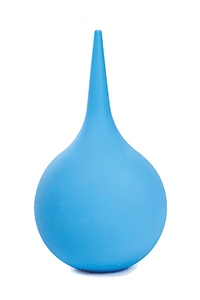
Enemas
Enemas have been popular for a long, long time. It makes sense that enemas were used historically; when individuals couldn’t take medicine by mouth, and before intravenous medication was common, there was only one route of administration left available! As humans paid more attention to cleaning themselves, it seemed logical to think that the place where waste left the body might require internal cleaning. However, today, there is controversy around enemas. Some celebrities, most of whom are not medical experts, claim that enemas are a cure-all with detoxifying and cleansing superpowers, but physicians are speaking out against the harms of certain popular enemas. In this article, we’ll discuss the truth about enemas, and go over some of the useful applications, as well as the more dangerous ones.
History of Enemas
An enema is a procedure that involves injecting a liquid, or occasionally a gas, into the rectum via the anus to either administer medication or flush out colon contents. Colonic irrigation (often shortened to ‘a colonic’) is a similar procedure that involves administering a continual flow of liquid for minutes to hours to clear out the colon completely rather than the single injection of enema fluid.
Humans have been using enemas for thousands of years. The oldest record of enema use comes from Egypt, mentioned in the Ebers Papyrus, a document written more than 3,500 years ago. Throughout time, people have had many reasons for using enemas, such as for providing nourishment to those unable to eat, ingesting intoxicants, torture, ritualistic or religious cleansing, sexual activity, and attempting to remedy various digestive ailments.
Medical Uses of Enemas
 Sometimes an enema is the best tool in a physician’s arsenal to treat or diagnose various gastrointestinal diseases and disorders. In this section, we will outline common and effective uses of the enema.
Sometimes an enema is the best tool in a physician’s arsenal to treat or diagnose various gastrointestinal diseases and disorders. In this section, we will outline common and effective uses of the enema.
 Delivering Medication
Delivering Medication
One of the most common medical uses of the enema is to administer medication directly to the source. Individuals with ulcerative colitis experience inflammation only in the rectum and large intestine. The gastrointestinal tract can digest or degrade medications orally consumed during its journey through the stomach and small intestine. For this reason, some medications for ulcerative colitis, such as 5-ASAs and corticosteroids, are available in enema form to deliver the medication directly to the inflamed area for more effective treatment.
 Constipation Relief
Constipation Relief
Enemas can be useful for those with severe constipation. When other treatments, such as dietary intervention, fibre supplements, or laxatives are ineffective, enemas containing salt solutions can help initiate a bowel movement. However, this method isn’t recommended for frequent use, and should only be done in cases where nothing else works, and when your physician gives you the okay, as there are more health risks with enemas than there are with standard constipation treatments.
 Bowel Emptying
Bowel Emptying
Your physician might recommend using an enema before a procedure or surgery that requires an empty intestine, such as colonoscopy. However, it is more likely that they will give you an oral preparation that clears out the colon than recommend an enema.
 Diagnostic Tests
Diagnostic Tests
If your physician wants to see the outline of your large intestine for diagnostic purposes, they might use a barium enema. This involves administration of a solution containing barium, followed by a series of X-rays. The barium coats the intestinal walls and allows the shape of your digestive tract to show up in X-rays.
Myths about Enemas
 Enemas Detoxify
Enemas Detoxify
Many proponents of home enemas claim that the main reason to perform enemas is to detoxify the intestinal tract, liver, and/or gallbladder. You might also hear claims that at any given time, a large amount of waste stays in your colon. However, this isn’t true, unless you are very constipated. Even then, whenever you have a bowel movement, it pushes things out roughly in the order it went in. Any waste that you eliminate during an enema is from recent meals and would have been eliminated during normal bowel movements in due time.
 Enemas Are Safe
Enemas Are Safe
While enemas can be a useful tool in medicine, giving yourself enemas at home can have many complications. An incorrectly administered enema can damage tissue in your rectum/colon, cause bowel perforation and, if the device is not sterile, infections.1 Long-term, regular use of enemas can cause electrolyte imbalances. Temporary side effects of enemas can include bloating and cramping.
Enemas can also affect the balance of microbiota in your gut. Many proponents of using home enemas to ‘detoxify’ often cite this as a good effect, saying it helps flush out harmful bacteria. However, enemas also negatively affect the good bacteria in the gut (probiotics), which can damage the microbiota balance and cause digestive symptoms.
 Coffee Enemas Are Beneficial
Coffee Enemas Are Beneficial
Coffee enemas first became popular in the 1920s, when a German scientist, Max Gerson, claimed that coffee enemas were more effective than standard saline enemas, because the coffee would be absorbed rectally, and could help stimulate the liver. Supposedly, this would detoxify the body and could even help cure cancer. However, it is important to note that in the past century, no researchers have published any quality studies showing that coffee enemas can improve health, and the scientific community continues to discredit Gerson’s unfounded ideas.2
Coffee can offer health benefits – such as antioxidants – when you drink it, but there is no advantage to taking coffee rectally. In fact, it comes with the risk of normal enema complications, and the potential for rectal burns if the coffee is too warm. It is also possible to take in too much caffeine, if you are using larger amounts of coffee than you would normally drink. If you want to enjoy coffee, it is best to enjoy drinking it in moderation.
Conclusion
While enemas definitely have their uses, there aren’t many situations where they are necessary. We have safer methods of medication administration, and we know that using enemas regularly doesn’t help detoxify or cleanse your colon. If your physician does recommend you use an enema for any reason, make sure to follow their instructions carefully to avoid unpleasant side effects and injuries.

